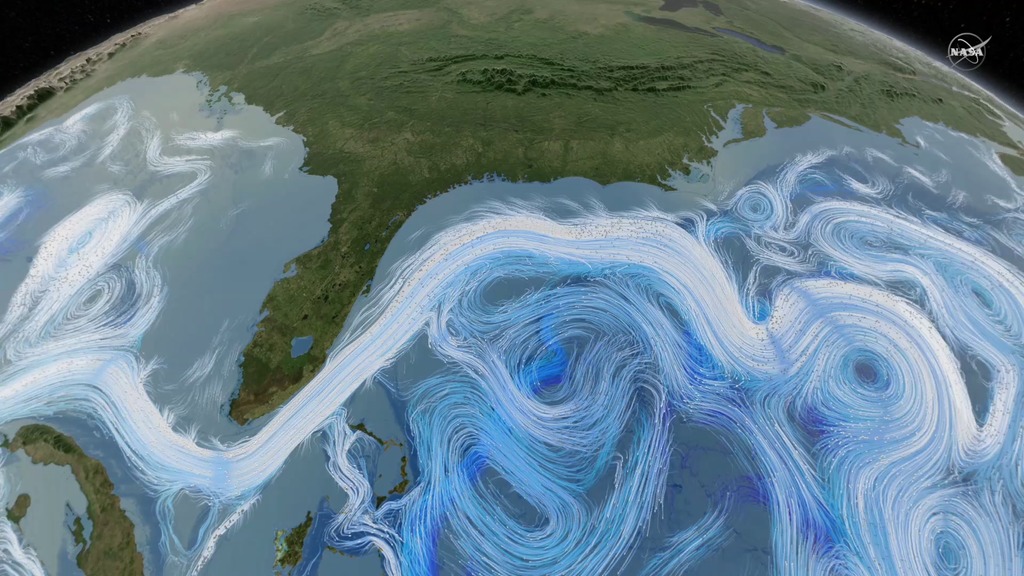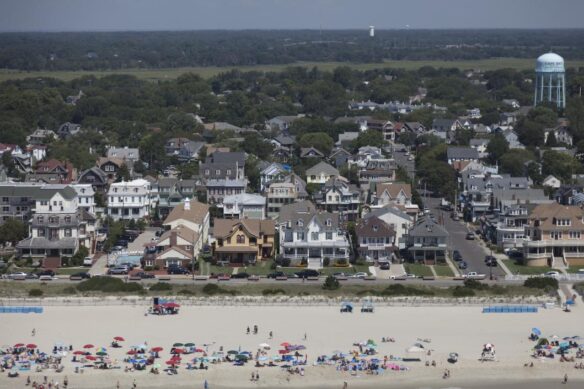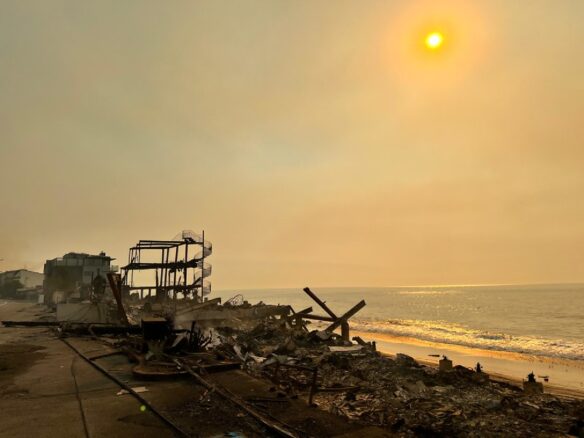Excerpt:
Scientists warn that a crucial ocean current could collapse, altering global weather
Scientists are sounding the alarm that a crucial component of the planet’s climate system is in gradual decline and could one day reach a tipping point that would radically alter global weather patterns.
The Atlantic Meridional Overturning Circulation, or AMOC, is a system of ocean currents that circulate water in the Atlantic Ocean like a conveyor belt, helping to redistribute heat and regulate global and regional climates. New research, however, warns that the AMOC is weakening under a warming climate, and could potentially suffer a dangerous and abrupt collapse with worldwide consequences.
“This is bad news for the climate system and humanity,” researchers from Utrecht University’s Institute for Marine and Atmospheric Research wrote in a new study published in the journal Science Advances.
Considering the AMOC is the workhorse of the Atlantic, the consequences of such a collapse would result in “hugely chaotic changes in global weather patterns” that extend far beyond the Atlantic, said Daniel Swain, a climate scientist with UCLA who was not involved in the study.
“It would plunge Europe into essentially a regionalized Ice Age, while leaving the rest of the world on its continued warming path,” Swain said. “The Southern Hemisphere would roast, the Pacific storm track would go kind of nuts, and there would be these extreme shifts in weather patterns that are very different from what you would expect from a more incremental or linear warming path.”
The odds of such a collapse are low — about 5% or 10% this century, according to some researchers — but the consequences are so great that it would be unwise to ignore the possibility, Swain said.
“There’s still a [90%] to 95% chance that won’t happen, but would you be willing to bet the farm on a [90%] to 95% chance that something like this doesn’t happen?” he said. “Would you get on a plane if there were a [90%] to 95% chance that it won’t crash? I certainly wouldn’t…”
See Also:
the Guardian (02-09-2024):
Atlantic Ocean circulation nearing ‘devastating’ tipping point, study finds
The circulation of the Atlantic Ocean is heading towards a tipping point that is “bad news for the climate system and humanity”, a study has found.
The scientists behind the research said they were shocked at the forecast speed of collapse once the point is reached, although they said it was not yet possible to predict how soon that would happen.
Using computer models and past data, the researchers developed an early warning indicator for the breakdown of the Atlantic meridional overturning circulation (Amoc), a vast system of ocean currents that is a key component in global climate regulation.
They found Amoc is already on track towards an abrupt shift, which has not happened for more than 10,000 years and would have dire implications for large parts of the world.
Amoc, which encompasses part of the Gulf Stream and other powerful currents, is a marine conveyer belt that carries heat, carbon and nutrients from the tropics towards the Arctic Circle, where it cools and sinks into the deep ocean. This churning helps to distribute energy around the Earth and modulates the impact of human-caused global heating…
the Conversation (02-11-2024):
Atlantic Ocean is headed for a tipping point − once melting glaciers shut down the Gulf Stream, we would see extreme climate change within decades, study shows
Superstorms, abrupt climate shifts and New York City frozen in ice. That’s how the blockbuster Hollywood movie “The Day After Tomorrow” depicted an abrupt shutdown of the Atlantic Ocean’s circulation and the catastrophic consequences.
While Hollywood’s vision was over the top, the 2004 movie raised a serious question: If global warming shuts down the Atlantic Meridional Overturning Circulation, which is crucial for carrying heat from the tropics to the northern latitudes, how abrupt and severe would the climate changes be?
Twenty years after the movie’s release, we know a lot more about the Atlantic Ocean’s circulation. Instruments deployed in the ocean starting in 2004 show that the Atlantic Ocean circulation has observably slowed over the past two decades, possibly to its weakest state in almost a millennium. Studies also suggest that the circulation has reached a dangerous tipping point in the past that sent it into a precipitous, unstoppable decline, and that it could hit that tipping point again as the planet warms and glaciers and ice sheets melt…
PBS Terra (08-22-2023):
Is Earth’s Largest Heat Transfer Really Shutting Down?
In this episode of Weathered, we travel to the Gulf Stream with the new PBS Terra show Sharks Unknown to experience the AMOC first hand. And we ask, what is the likelihood that the AMOC will collapse, and what would the consequences be?
CBC News (08-03-2023):
What happens if a crucial ocean current collapses? | About That
A major ocean current responsible for circulating water in the Atlantic Ocean and maintaining global weather patterns is at risk of collapsing. About That producer Lauren Bird explains why it’s believed to be weakening, and what experts warn could happen if it does.









